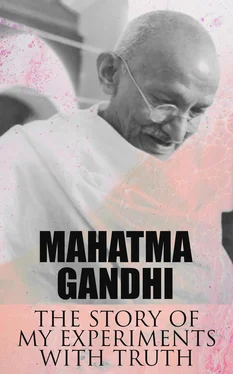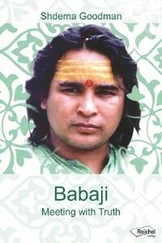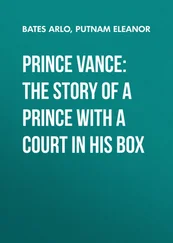So even in this mission I was comparatively disappointed. I thought justice was not done to my clients, but I had not the means to secure it. At the most I could have appealed to the Political Agent or to the Governor who would have dismissed the appeal saying, ‘we decline to interfere.’ If there had been any rule or regulation governing such decisions, it would have been something, but here thesabib’s will was law.
I was exasperated.
In the meantime a Meman firm from Porbandar wrote to my brother making the following offer: ‘We have business in South Africa. Ours is a big firm, and we have a big case there in the Court, our claim being £ 40,000. It has been going on for a long time. We have engaged the services of the best vakils and barristers. If you sent your brother there, he would be useful to us and also to himself. He would be able to instruct our counsel better than ourselves. And he would have the advantage of seeing a new part of the world, and of making new acquaintances.’
My brother discussed the proposition with me. I could not make out whether I had simply to instruct the counsel or to appear in court. But I was tempted.
My brother introduced me to the late Sheth Abdul Karim Jhaveri, a partner of Dada Abdulla and Co., the firm in question. ‘It won’t be a difficult job,’ the Sheth assured me. ‘We have big Europeans as our friends, whose acquaintance you will make. You can be useful to us in our shop. Much of our correspondence is in English and you can help us with that too. You will, of course, be our guest and hence will have no expense whatever.’
‘How long do you require my services?’ I asked. ‘And what will be the payment?’
‘Not more than a year. We will pay you a first class return fare and a sum of £ 105, all found.’
This was hardly going there as a barrister. It was going as a servant of the firm. But I wanted somehow to leave India. There was also the tempting opportunity of seeing a new country, and of having new experience. Also I could send £ 105 to my brother and help in the expenses of the household. I closed with the offer without any higgling, and got ready to go to South Africa.
Table of Contents
When starting for South Africa I did not feel the wrench of separation which I had experienced when leaving for England. My mother was now no more. I had gained some knowledge of the world and of travel abroad, and going from Rajkot to Bombay was no unusual affair.
This time I only felt the pang of parting with my wife. Another baby had been born to us since my return from England. Our love could not yet be called free from lust, but it was getting gradually purer. Since my return from Europe, we had lived very little together; and as I had now become her teacher, however indifferent, and helped her to make certain reforms, we both felt the necessity of being more together, if only to continue the reforms. But the attraction of South Africa rendered the separation bearable. ‘We are bound to meet again in a year,’ I said to her, by way of consolation, and left Rajkot for Bombay.
Here I was to get my passage through the agent of Dada Abdulla and Company. But no berth was available on the boat, and if I did not sail then, I should be stranded in Bombay. ‘We have tried our best,’ said the agent, ‘to secure a first class passage, but in vain—unless you are prepared to go on deck. Your meals can be arranged for in the saloon.’ Those were the days of my first class travelling, and how could a barrister travel as a deck passenger? So I refused the offer. I suspected the agent’s veracity, for I could not believe that a first class passage was not available. With the agent’s consent I set about securing it myself. I went on board the boat and met the chief officer. He said to me quite frankly, ‘We do not usually have such a rush. But as the Governor-General of Mozambique is going by this boat, all the berths are engaged.’
‘Could you not possibly squeeze me in?’ I asked.
He surveyed me from top to toe and smiled, ‘There is just one way,’ he said. ‘There is an extra berth in my cabin, which is usually not available for passengers. But I am prepared to give it to you.’ I thanked him and got the agent to purchase the passage. In April 1893 I set forth full of zest to try my luck in South Africa.
The first port of call was Lamu which we reached in about thirteen days. The Captain and I had become great friends by this time. He was fond of playing chess, but as he was quite a novice, he wanted one still more of a beginner for his partner, and so he invited me. I had heard a lot about the game but had never tried my hand at it. Players used to say that this was a game in which there was plenty of scope for the exercise of one’s intelligence. The Captain offered to give me lessons, and he found me a good pupil as I had unlimited patience. Every time I was the loser, and that made him all the more eager to teach me. I liked the game, but never carried my liking beyond the boat or my knowledge beyond the moves of the pieces.
At Lamu the ship remained at anchor for some three to four hours, and I landed to see the port. The Captain had also gone ashore, but he had warned me that the harbour was treacherous and that I should return in good time.
It was a very small place. I went to the Post Office and was delighted to see the Indian clerks there, and had a talk with them. I also saw the Africans and tried to acquaint myself with their ways of life which interested me very much. This took up some time.
There were some deck passengers with whom I had made acquaintance, and who had landed with a view to cooking their food on shore and having a quiet meal. I now found them preparing to return to the steamer, so we all got into the same boat. The tide was high in the harbour and our boat had more than its proper load. The current was so strong that it was impossible to hold the boat to the ladder of the steamer. It would just touch the ladder and be drawn away again by the current. The first whistle to start had already gone. I was worried. The Captain was witnessing our plight from the bridge. He ordered the steamer to wait an extra five minutes. There was another boat near the ship which a friend hired for me for ten rupees. This boat picked me up from the overloaded one. The ladder had already been raised. I had therefore to be drawn up by means of a rope and the steamer started immediately. The other passengers were left behind. I now appreciated the Captain’s warning.
After Lamu the next port was Mombasa and then Zanzibar. The halt here was a long one—eight or ten days—and we then changed to another boat.
The Captain liked me much but the liking took an undesirable turn. He invited an English friend and me to accompany him on an outing, and we all went ashore in his boat. I had not the least notion of what the outing meant. And little did the Captain know what an ignoramus I was in such matters. We were taken to some Negro women’s quarters by a tout. We were each shown into a room. I simply stood there dumb with shame. Heaven only knows what the poor woman must have thought of me. When the Captain called me I came out just as I had gone in. He saw my innocence. At first I felt very much ashamed, but as I could not think of the thing except with horror, the sense of shame wore away, and I thanked God that the sight of the woman had not moved me in the least. I was disgusted at my weakness and pitied myself for not having had the courage to refuse to go into the room.
This in my life was the third trial of its kind. Many a youth, innocent at first, must have been drawn into sin by a false sense of shame. I could claim no credit for having come out unscathed. I could have credit if I had refused to enter that room. I must entirely thank the All-merciful for having saved me. The incident increased my faith in God and taught me, to a certain extent, to cast off false shame.
Читать дальше












